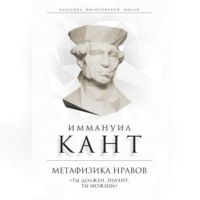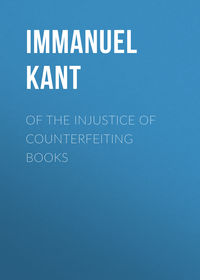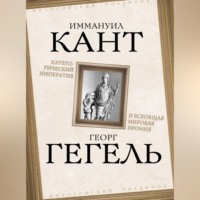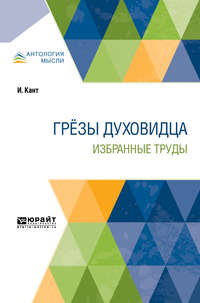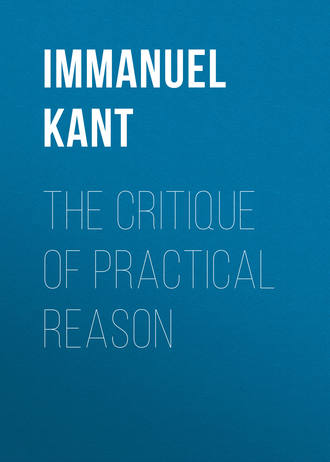 полная версия
полная версияThe Critique of Practical Reason
{BOOK_2|CHAPTER_2 ^paragraph 40}
V. The Existence of God as a Postulate of Pure Practical Reason.
In the foregoing analysis the moral law led to a practical problem which is prescribed by pure reason alone, without the aid of any sensible motives, namely, that of the necessary completeness of the first and principle element of the summum bonum, viz., morality; and, as this can be perfectly solved only in eternity, to the postulate of immortality. The same law must also lead us to affirm the possibility of the second element of the summum bonum, viz., happiness proportioned to that morality, and this on grounds as disinterested as before, and solely from impartial reason; that is, it must lead to the supposition of the existence of a cause adequate to this effect; in other words, it must postulate the existence of God, as the necessary condition of the possibility of the summum bonum (an object of the will which is necessarily connected with the moral legislation of pure reason). We proceed to exhibit this connection in a convincing manner.
Happiness is the condition of a rational being in the world with whom everything goes according to his wish and will; it rests, therefore, on the harmony of physical nature with his whole end and likewise with the essential determining principle of his will. Now the moral law as a law of freedom commands by determining principles, which ought to be quite independent of nature and of its harmony with our faculty of desire (as springs). But the acting rational being in the world is not the cause of the world and of nature itself. There is not the least ground, therefore, in the moral law for a necessary connection between morality and proportionate happiness in a being that belongs to the world as part of it, and therefore dependent on it, and which for that reason cannot by his will be a cause of this nature, nor by his own power make it thoroughly harmonize, as far as his happiness is concerned, with his practical principles. Nevertheless, in the practical problem of pure reason, i.e., the necessary pursuit of the summum bonum, such a connection is postulated as necessary: we ought to endeavour to promote the summum bonum, which, therefore, must be possible. Accordingly, the existence of a cause of all nature, distinct from nature itself and containing the principle of this connection, namely, of the exact harmony of happiness with morality, is also postulated. Now this supreme cause must contain the principle of the harmony of nature, not merely with a law of the will of rational beings, but with the conception of this law, in so far as they make it the supreme determining principle of the will, and consequently not merely with the form of morals, but with their morality as their motive, that is, with their moral character. Therefore, the summum bonum is possible in the world only on the supposition of a Supreme Being having a causality corresponding to moral character. Now a being that is capable of acting on the conception of laws is an intelligence (a rational being), and the causality of such a being according to this conception of laws is his will; therefore the supreme cause of nature, which must be presupposed as a condition of the summum bonum is a being which is the cause of nature by intelligence and will, consequently its author, that is God. It follows that the postulate of the possibility of the highest derived good (the best world) is likewise the postulate of the reality of a highest original good, that is to say, of the existence of God. Now it was seen to be a duty for us to promote the summum bonum; consequently it is not merely allowable, but it is a necessity connected with duty as a requisite, that we should presuppose the possibility of this summum bonum; and as this is possible only on condition of the existence of God, it inseparably connects the supposition of this with duty; that is, it is morally necessary to assume the existence of God.
It must be remarked here that this moral necessity is subjective, that is, it is a want, and not objective, that is, itself a duty, for there cannot be a duty to suppose the existence of anything (since this concerns only the theoretical employment of reason). Moreover, it is not meant by this that it is necessary to suppose the existence of God as a basis of all obligation in general (for this rests, as has been sufficiently proved, simply on the autonomy of reason itself). What belongs to duty here is only the endeavour to realize and promote the summum bonum in the world, the possibility of which can therefore be postulated; and as our reason finds it not conceivable except on the supposition of a supreme intelligence, the admission of this existence is therefore connected with the consciousness of our duty, although the admission itself belongs to the domain of speculative reason. Considered in respect of this alone, as a principle of explanation, it may be called a hypothesis, but in reference to the intelligibility of an object given us by the moral law (the summum bonum), and consequently of a requirement for practical purposes, it may be called faith, that is to say a pure rational faith, since pure reason (both in its theoretical and practical use) is the sole source from which it springs.
{BOOK_2|CHAPTER_2 ^paragraph 45}
From this deduction it is now intelligible why the Greek schools could never attain the solution of their problem of the practical possibility of the summum bonum, because they made the rule of the use which the will of man makes of his freedom the sole and sufficient ground of this possibility, thinking that they had no need for that purpose of the existence of God. No doubt they were so far right that they established the principle of morals of itself independently of this postulate, from the relation of reason only to the will, and consequently made it the supreme practical condition of the summum bonum; but it was not therefore the whole condition of its possibility. The Epicureans had indeed assumed as the supreme principle of morality a wholly false one, namely that of happiness, and had substituted for a law a maxim of arbitrary choice according to every man's inclination; they proceeded, however, consistently enough in this, that they degraded their summum bonum likewise, just in proportion to the meanness of their fundamental principle, and looked for no greater happiness than can be attained by human prudence (including temperance and moderation of the inclinations), and this as we know would be scanty enough and would be very different according to circumstances; not to mention the exceptions that their maxims must perpetually admit and which make them incapable of being laws. The Stoics, on the contrary, had chosen their supreme practical principle quite rightly, making virtue the condition of the summum bonum; but when they represented the degree of virtue required by its pure law as fully attainable in this life, they not only strained the moral powers of the man whom they called the wise beyond all the limits of his nature, and assumed a thing that contradicts all our knowledge of men, but also and principally they would not allow the second element of the summum bonum, namely, happiness, to be properly a special object of human desire, but made their wise man, like a divinity in his consciousness of the excellence of his person, wholly independent of nature (as regards his own contentment); they exposed him indeed to the evils of life, but made him not subject to them (at the same time representing him also as free from moral evil). They thus, in fact, left out the second element of the summum bonum namely, personal happiness, placing it solely in action and satisfaction with one's own personal worth, thus including it in the consciousness of being morally minded, in which they Might have been sufficiently refuted by the voice of their own nature.
The doctrine of Christianity, 14 even if we do not yet consider it as a religious doctrine, gives, touching this point, a conception of the summum bonum (the kingdom of God), which alone satisfies the strictest demand of practical reason. The moral law is holy (unyielding) and demands holiness of morals, although all the moral perfection to which man can attain is still only virtue, that is, a rightful disposition arising from respect for the law, implying consciousness of a constant propensity to transgression, or at least a want of purity, that is, a mixture of many spurious (not moral) motives of obedience to the law, consequently a self-esteem combined with humility. In respect, then, of the holiness which the Christian law requires, this leaves the creature nothing but a progress in infinitum, but for that very reason it justifies him in hoping for an endless duration of his existence. The worth of a character perfectly accordant with the moral law is infinite, since the only restriction on all possible happiness in the judgement of a wise and all powerful distributor of it is the absence of conformity of rational beings to their duty. But the moral law of itself does not promise any happiness, for according to our conceptions of an order of nature in general, this is not necessarily connected with obedience to the law. Now Christian morality supplies this defect (of the second indispensable element of the summum bonum) by representing the world in which rational beings devote themselves with all their soul to the moral law, as a kingdom of God, in which nature and morality are brought into a harmony foreign to each of itself, by a holy Author who makes the derived summum bonum possible. Holiness of life is prescribed to them as a rule even in this life, while the welfare proportioned to it, namely, bliss, is represented as attainable only in an eternity; because the former must always be the pattern of their conduct in every state, and progress towards it is already possible and necessary in this life; while the latter, under the name of happiness, cannot be attained at all in this world (so far as our own power is concerned), and therefore is made simply an object of hope. Nevertheless, the Christian principle of morality itself is not theological (so as to be heteronomy), but is autonomy of pure practical reason, since it does not make the knowledge of God and His will the foundation of these laws, but only of the attainment of the summum bonum, on condition of following these laws, and it does not even place the proper spring of this obedience in the desired results, but solely in the conception of duty, as that of which the faithful observance alone constitutes the worthiness to obtain those happy consequences.
{BOOK_2|CHAPTER_2 ^paragraph 50}
In this manner, the moral laws lead through the conception of the summum bonum as the object and final end of pure practical reason to religion, that is, to the recognition of all duties as divine commands, not as sanctions, that is to say, arbitrary ordinances of a foreign and contingent in themselves, but as essential laws of every free will in itself, which, nevertheless, must be regarded as commands of the Supreme Being, because it is only from a morally perfect (holy and good) and at the same time all-powerful will, and consequently only through harmony with this will, that we can hope to attain the summum bonum which the moral law makes it our duty to take as the object of our endeavours. Here again, then, all remains disinterested and founded merely on duty; neither fear nor hope being made the fundamental springs, which if taken as principles would destroy the whole moral worth of actions. The moral law commands me to make the highest possible good in a world the ultimate object of all my conduct. But I cannot hope to effect this otherwise than by the harmony of my will with that of a holy and good Author of the world; and although the conception of the summum bonum as a whole, in which the greatest happiness is conceived as combined in the most exact proportion with the highest degree of moral perfection (possible in creatures), includes my own happiness, yet it is not this that is the determining principle of the will which is enjoined to promote the summum bonum, but the moral law, which, on the contrary, limits by strict conditions my unbounded desire of happiness.
Hence also morality is not properly the doctrine how we should make ourselves happy, but how we should become worthy of happiness. It is only when religion is added that there also comes in the hope of participating some day in happiness in proportion as we have endeavoured to be not unworthy of it.
A man is worthy to possess a thing or a state when his possession of it is in harmony with the summum bonum. We can now easily see that all worthiness depends on moral conduct, since in the conception of the summum bonum this constitutes the condition of the rest (which belongs to one's state), namely, the participation of happiness. Now it follows from this that morality should never be treated as a doctrine of happiness, that is, an instruction how to become happy; for it has to do simply with the rational condition (conditio sine qua non) of happiness, not with the means of attaining it. But when morality has been completely expounded (which merely imposes duties instead of providing rules for selfish desires), then first, after the moral desire to promote the summum bonum (to bring the kingdom of God to us) has been awakened, a desire founded on a law, and which could not previously arise in any selfish mind, and when for the behoof of this desire the step to religion has been taken, then this ethical doctrine may be also called a doctrine of happiness because the hope of happiness first begins with religion only.
We can also see from this that, when we ask what is God's ultimate end in creating the world, we must not name the happiness of the rational beings in it, but the summum bonum, which adds a further condition to that wish of such beings, namely, the condition of being worthy of happiness, that is, the morality of these same rational beings, a condition which alone contains the rule by which only they can hope to share in the former at the hand of a wise Author. For as wisdom, theoretically considered, signifies the knowledge of the summum bonum and, practically, the accordance of the will with the summum bonum, we cannot attribute to a supreme independent wisdom an end based merely on goodness. For we cannot conceive the action of this goodness (in respect of the happiness of rational beings) as suitable to the highest original good, except under the restrictive conditions of harmony with the holiness 15 of his will. Therefore, those who placed the end of creation in the glory of God (provided that this is not conceived anthropomorphically as a desire to be praised) have perhaps hit upon the best expression. For nothing glorifies God more than that which is the most estimable thing in the world, respect for his command, the observance of the holy duty that his law imposes on us, when there is added thereto his glorious plan of crowning such a beautiful order of things with corresponding happiness. If the latter (to speak humanly) makes Him worthy of love, by the former He is an object of adoration. Even men can never acquire respect by benevolence alone, though they may gain love, so that the greatest beneficence only procures them honour when it is regulated by worthiness.
{BOOK_2|CHAPTER_2 ^paragraph 55}
That in the order of ends, man (and with him every rational being) is an end in himself, that is, that he can never be used merely as a means by any (not even by God) without being at the same time an end also himself, that therefore humanity in our person must be holy to ourselves, this follows now of itself because he is the subject of the moral law, in other words, of that which is holy in itself, and on account of which and in agreement with which alone can anything be termed holy. For this moral law is founded on the autonomy of his will, as a free will which by its universal laws must necessarily be able to agree with that to which it is to submit itself.
VI. Of the Postulates of Pure Practical Reason Generally.
{BOOK_2|CHAPTER_2 ^paragraph 60}
They all proceed from the principle of morality, which is not a postulate but a law, by which reason determines the will directly, which will, because it is so determined as a pure will, requires these necessary conditions of obedience to its precept. These postulates are not theoretical dogmas but, suppositions practically necessary; while then they do [not] extend our speculative knowledge, they give objective reality to the ideas of speculative reason in general (by means of their reference to what is practical), and give it a right to concepts, the possibility even of which it could not otherwise venture to affirm.
These postulates are those of immortality, freedom positively considered (as the causality of a being so far as he belongs to the intelligible world), and the existence of God. The first results from the practically necessary condition of a duration adequate to the complete fulfilment of the moral law; the second from the necessary supposition of independence of the sensible world, and of the faculty of determining one's will according to the law of an intelligible world, that is, of freedom; the third from the necessary condition of the existence of the summum bonum in such an intelligible world, by the supposition of the supreme independent good, that is, the existence of God.
Thus the fact that respect for the moral law necessarily makes the summum bonum an object of our endeavours, and the supposition thence resulting of its objective reality, lead through the postulates of practical reason to conceptions which speculative reason might indeed present as problems, but could never solve. Thus it leads: 1. To that one in the solution of which the latter could do nothing but commit paralogisms (namely, that of immortality), because it could not lay hold of the character of permanence, by which to complete the psychological conception of an ultimate subject necessarily ascribed to the soul in self-consciousness, so as to make it the real conception of a substance, a character which practical reason furnishes by the postulate of a duration required for accordance with the moral law in the summum bonum, which is the whole end of practical reason. 2. It leads to that of which speculative reason contained nothing but antinomy, the solution of which it could only found on a notion problematically conceivable indeed, but whose objective reality it could not prove or determine, namely, the cosmological idea of an intelligible world and the consciousness of our existence in it, by means of the postulate of freedom (the reality of which it lays down by virtue of the moral law), and with it likewise the law of an intelligible world, to which speculative reason could only point, but could not define its conception. 3. What speculative reason was able to think, but was obliged to leave undetermined as a mere transcendental ideal, viz., the theological conception of the first Being, to this it gives significance (in a practical view, that is, as a condition of the possibility of the object of a will determined by that law), namely, as the supreme principle of the summum bonum in an intelligible world, by means of moral legislation in it invested with sovereign power.
Is our knowledge, however, actually extended in this way by pure practical reason, and is that immanent in practical reason which for the speculative was only transcendent? Certainly, but only in a practical point of view. For we do not thereby take knowledge of the nature of our souls, nor of the intelligible world, nor of the Supreme Being, with respect to what they are in themselves, but we have merely combined the conceptions of them in the practical concept of the summum bonum as the object of our will, and this altogether a priori, but only by means of the moral law, and merely in reference to it, in respect of the object which it commands. But how freedom is possible, and how we are to conceive this kind of causality theoretically and positively, is not thereby discovered; but only that there is such a causality is postulated by the moral law and in its behoof. It is the same with the remaining ideas, the possibility of which no human intelligence will ever fathom, but the truth of which, on the other hand, no sophistry will ever wrest from the conviction even of the commonest man.
{BOOK_2|CHAPTER_2 ^paragraph 65}
VII. How is it possible to conceive an Extension of Pure Reason in a Practical point of view, without its Knowledge as Speculative being enlarged at the same time?
{BOOK_2|CHAPTER_2 ^paragraph 70}
In order not to be too abstract, we will answer this question at once in its application to the present case. In order to extend a pure cognition practically, there must be an a priori purpose given, that is, an end as object (of the will), which independently of all theological principle is presented as practically necessary by an imperative which determines the will directly (a categorical imperative), and in this case that is the summum bonum. This, however, is not possible without presupposing three theoretical conceptions (for which, because they are mere conceptions of pure reason, no corresponding intuition can be found, nor consequently by the path of theory any objective reality); namely, freedom, immortality, and God. Thus by the practical law which commands the existence of the highest good possible in a world, the possibility of those objects of pure speculative reason is postulated, and the objective reality which the latter could not assure them. By this the theoretical knowledge of pure reason does indeed obtain an accession; but it consists only in this, that those concepts which otherwise it had to look upon as problematical (merely thinkable) concepts, are now shown assertorially to be such as actually have objects; because practical reason indispensably requires their existence for the possibility of its object, the summum bonum, which practically is absolutely necessary, and this justifies theoretical reason in assuming them. But this extension of theoretical reason is no extension of speculative, that is, we cannot make any positive use of it in a theoretical point of view. For as nothing is accomplished in this by practical reason, further than that these concepts are real and actually have their (possible) objects, and nothing in the way of intuition of them is given thereby (which indeed could not be demanded), hence the admission of this reality does not render any synthetical proposition possible. Consequently, this discovery does not in the least help us to extend this knowledge of ours in a speculative point of view, although it does in respect of the practical employment of pure reason. The above three ideas of speculative reason are still in themselves not cognitions; they are however (transcendent) thoughts, in which there is nothing impossible. Now, by help of an apodeictic practical law, being necessary conditions of that which it commands to be made an object, they acquire objective reality; that is, we learn from it that they have objects, without being able to point out how the conception of them is related to an object, and this, too, is still not a cognition of these objects; for we cannot thereby form any synthetical judgement about them, nor determine their application theoretically; consequently, we can make no theoretical rational use of them at all, in which use all speculative knowledge of reason consists. Nevertheless, the theoretical knowledge, not indeed of these objects, but of reason generally, is so far enlarged by this, that by the practical postulates objects were given to those ideas, a merely problematical thought having by this means first acquired objective reality. There is therefore no extension of the knowledge of given supersensible objects, but an extension of theoretical reason and of its knowledge in respect of the supersensible generally; inasmuch as it is compelled to admit that there are such objects, although it is not able to define them more closely, so as itself to extend this knowledge of the objects (which have now been given it on practical grounds, and only for practical use). For this accession, then, pure theoretical reason, for which all those ideas are transcendent and without object, has simply to thank its practical faculty. In this they become immanent and constitutive, being the source of the possibility of realizing the necessary object of pure practical reason (the summum bonum); whereas apart from this they are transcendent, and merely regulative principles of speculative reason, which do not require it to assume a new object beyond experience, but only to bring its use in experience nearer to completeness. But when once reason is in possession of this accession, it will go to work with these ideas as speculative reason (properly only to assure the certainty of its practical use) in a negative manner: that is, not extending but clearing up its knowledge so as on one side to keep off anthropomorphism, as the source of superstition, or seeming extension of these conceptions by supposed experience; and on the other side fanaticism, which promises the same by means of supersensible intuition or feelings of the like kind. All these are hindrances to the practical use of pure reason, so that the removal of them may certainly be considered an extension of our knowledge in a practical point of view, without contradicting the admission that for speculative purposes reason has not in the least gained by this.



